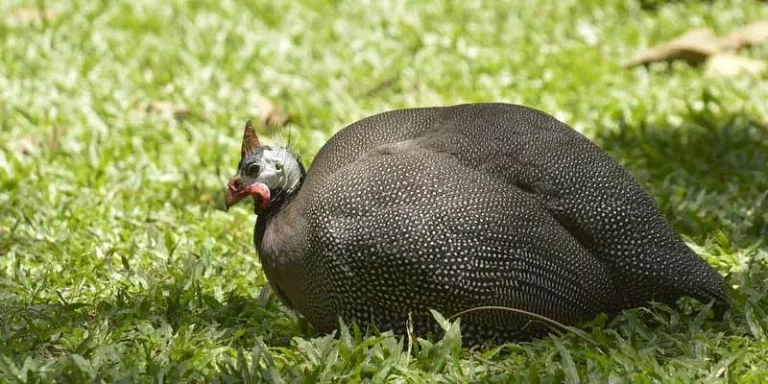When it comes to raising guinea fowl, one of the most common questions that people have is often related to their eggs. After all, if you are planning on using your guinea fowl for food, you will want to know what you can expect from them. While some people may be interested in harvesting the meat, others might prefer to simply get more eggs from their hens.
In this article, we will take a look at the average amount of eggs that a guinea fowl hen lays each year and how many she can lay in her lifetime.
How Many Eggs Does a Guinea Fowl Lay?
When a guinea fowl is not broody, she will lay about 1 egg a day during her laying season. This will amount to about 6-7 eggs per week.
In a given year, guinea fowl will lay between 90 and 130 eggs. The actual number will depend on the species, temperature, age, and environment.
Due to their low egg-laying numbers, most people raise them for their meat instead or keep them around to help fend off predators.
At What Age Do Guinea Fowl Start Laying Eggs?
Guinea fowl, also known as guineas or pintades, is a type of game bird. Many people keep them for their meat and their interesting appearance. They are also very good at guarding properties against snakes and other varmints. Some people keep them for their eggs, which are larger than chicken eggs and have a richer flavor. When you get guineas, you probably want to know how soon you can start eating the eggs.
Guineas lay best when they are between one and two years of age, but they can start laying eggs when they are only six months old. Guinea fowl usually lay best in the spring and summer months, but they will continue to lay throughout the winter if they have enough food and water, daytime temperatures over freezing, and plenty of light. If your days become shorter in the winter due to winter weather, you may need to provide extra light for your guineas. In some cases, even that might not be enough to stimulate egg production during the winter months.
When guineas first start laying eggs in the spring of their first year, they often produce small clutches of around ten eggs at a time before starting regular egg production.
Where Do Guinea Fowl Nest and Lay Their Eggs?
Guinea fowl is one of the most popular free-range poultry raised in the U.S., but many novice chicken keepers don’t know where they nest or lay eggs. The answer to this question depends on two things: how old the guinea fowl is, and what type of housing it is kept in.
Guinea hens, like other poultry, prefer to have a quiet, secluded nesting area to lay their eggs. Most will use a hen house or coop for this purpose if it is available. However, if no suitable site exists, many will simply find a spot on their own.
Guinea hens don’t build nests or roost in trees—instead, they lay their eggs on the ground. Unlike chickens, who will only lay one egg per day, guineas can lay up to three eggs per day. These eggs are slightly larger than chicken eggs, with more of an oval shape than the traditional chicken egg. Guinea eggs have a harder shell than chicken eggs and can be used in their place in any recipe that calls for chicken eggs.
However, guinea fowl tend to wander and scatter their eggs throughout your farm or yard instead of laying them in one spot. This means that you’ll have to hunt for the dozen or so eggs each guinea hen lays every few days if you want to collect them for yourself. If you don’t mind scavenging for your breakfast food.
How Many Eggs Does a Guinea Fowl Lay in a Year?
The number of eggs that a guinea fowl lays in a year depends on the particular breed and climate, as well as the age of the guinea fowl. The average number of eggs a guinea fowl lays in a year is around 100. Some guinea fowls can lay up to 130 eggs in a year, while other breeds may not lay more than 90.
How Long Do Guinea Fowl Lay Eggs?
The length of time you can expect your guinea hens to lay will depend on several factors. You should take into consideration things such as the size of your flock and how many hens are actively laying eggs.
For example, if you have three hens and only two of them are laying eggs at any given time then your flock will produce fewer eggs than if all three were laying regularly. The age at which a hen starts producing chicks also plays an important role in determining how long she will continue producing offspring before stopping altogether or taking a break from doing so for several months until conditions improve enough for her to resume laying again.
It’s important to note that the length of time it takes a hen to begin producing offspring again after she stops depends on many different factors such as her overall health status as well as environmental conditions like temperature fluctuations in temperature during summer months or changes in humidity levels throughout winter months etc.
In Summary
f you’re planning to raise guinea fowl for their eggs, you will be disappointed. They tend to not lay a lot of eggs as chickens or ducks do. On average, a guinea fowl will lay just 6-7 eggs per week.


